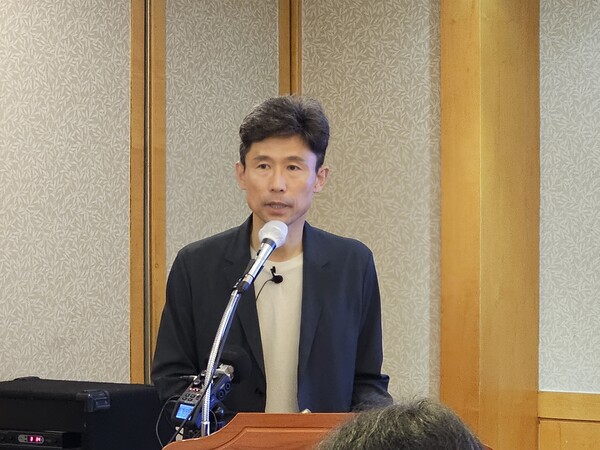Genome & Company, a Korean biotech firm listed on Kosdaq, aims to achieve profitability within five years by developing new antibodies targeting antibody-drug conjugates (ADCs) and signing a big licensing-out deal, its CEO Hong Yoo-seok said on Thursday.
ADCs, engineered to recognize specific proteins on cancer cells, precisely deliver powerful drugs to the cancer cells, halting their growth or killing them, while sparing healthy cells. By only targeting harmfull cells, ADCs aim to mitigate the adverse effects associated with conventional cancer treatments like chemotherapy, which often harm helathy cells.

Genome & Company, formerly a microbiome player developing microbiome-based therapies, announced last year that it would shift its focus to oncology and ADCs.
During the press conference on Thursday, Hong showcased a significant milestone: the successful execution of its first technology transfer agreement in the field of novel targeted cancer therapy with Swiss pharmaceutical company, Debiopharm, initially disclosed on June 3.
This agreement not only underscored the company’s research capabilities in the field of antibodies for new target ADCs but also signaled its intent to capitalize on this success through future technology transfers, he said.
Hong also outlined its expansive research and development (R&D) strategy for the long haul, which is geared towards promoting large-scale technology transfers by developing a "first-in-class ADC that combines antibodies, linkers, and payloads to create new target ADCs."
Central to their portfolio is GENA-104, a “promising immuno-oncology drug that has the potential to break through as a novel antibody for ADCs,” Hong said.
GENA-104 is designed to inhibit CNTN4, a novel target discovered through their proprietary platform, GNOCLE. For four consecutive years, the efficacy of GENA-104 has been showcased at the American Association for Cancer Research (AACR), with notable preclinical results presented at AACR 2024.
Beyond GENA-104, Genome & Company is channeling its R&D efforts on the discovery of new targets and the development of antibodies for ADCs.
Debiopharm currently holds exclusive rights to develop and commercialize ADC therapeutics using GENA-111 and its cleavable linker technology, Multilink, compatible with any conjugation technology to produce ADCs with high DAR(drug-to-antoibody ratio) and allows the loading of multiple payloads on any antibody. Currently, Genome & Company is conducting preclinical trials for three drug pipelines, including GENA-120.
“Currently, we are actively discussing transferring the technology for the following pipeline,” he said. “We will continue to develop antibodies for new target ADCs, demonstrate repeated technology transfer in the preclinical phase, and then promote large-scale technology transfer to our own new target ADCs, which is expected to enter the clinical stage in three to five years.”
In parallel, Hong announced the company's strategic vision for the microbiome sector, emphasizing a multifaceted approach to commercialization, based on their trove of preclinical microbiome data alongside new drug development initiatives. Forecasts indicate an exponential 400 percent year-over-year sales surge in their cosmetics division, and they anticipate self-financed growth within five years by expanding into a novel medical-grade probiotics market.
Meanwhile, Genome & Company's cosmetics brand, UIQ, has seen a robust growth, with sales increasing by over 390 percent year-over-year in the first quarter of 2014. The company plans to expand its market to 14 overseas countries, including Japan.
Hong went on to say that Genome & Company’s medical-grade probiotics business, which will be promoted in the U.S. market as a new business, is a premium business model developed in accordance with the U.S. FDA's regulations for medical food.
The medical-grade probiotics sector holds high profitability, minimal competition, and enduring brand equity, setting it apart from general probiotics products on the market, he said. Genome & Company intends to launch a number of products in the next two to three years based on its accumulated microbiome research.
Related articles
- LG Chem begins US phase 1 trial for next-gen immune checkpoint inhibitor
- [Reporter's Notebook] Genome & Company refused to disclose indications after technology transfer. Why?
- [BIO USA 2024] Antibody drug market will keep growing: Samsung Biologics CEO
- Genome & Company floats ₩4.5 billion CBs to develop antibodies for ADCs
- Genome & Company's GENA-104 study published in Science Immunology
- Genome & Company licenses out immunotherapy GENA-104 to UK’s Ellipses Pharma for global development
- Genome & Company halts phase 2 microbiome immunotherapy trial in bile duct cancer
- Genome & Company raises ₩54 bil. won via US subsidiary to fuel ADC, microbiome growth

